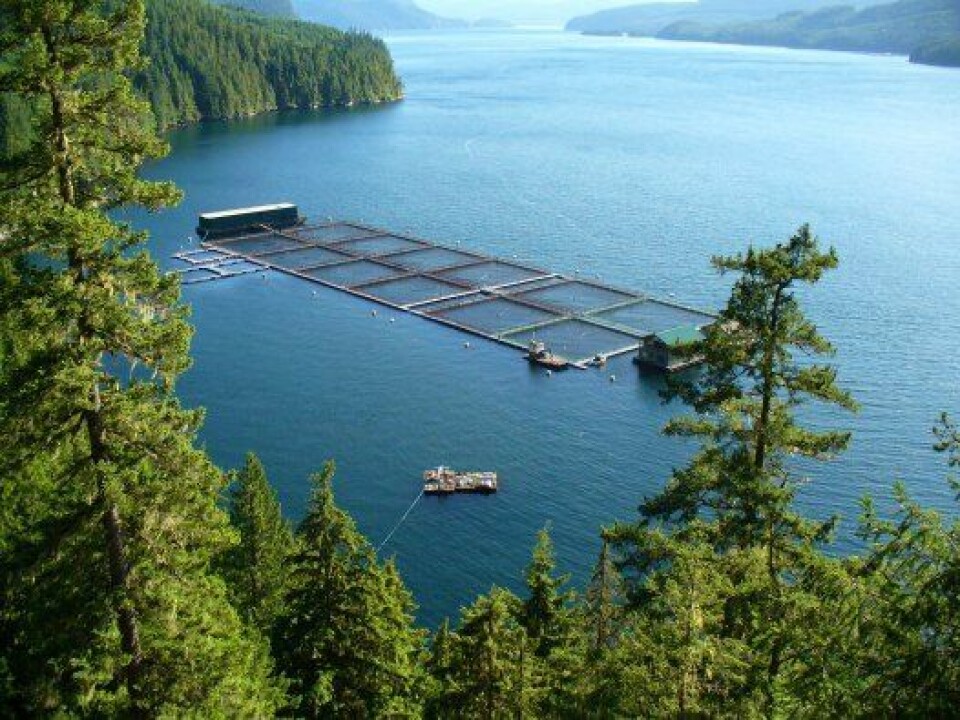
Open net pens under threat
If Bill C-228 - which will be voted on in Canada's House of Commons later this month - is passed, it could require BC's entire finfish aquaculture industry to move to closed containment production systems, cause huge job losses and possibly devastate wild salmon stocks, according to a land-based salmon producer.
On February 24th, 2016 Fin Donnelly, MP introduced Bill C-228 which aims to amend the Fisheries Act to protect wild salmon from the dangers of open pen salmon farms. The second reading followed by an hour of debate took take place November 1st, and an official vote is set to happen later this month.
According to openparliment.ca, the enactment "will to require that finfish aquaculture for commercial purposes in Canadian fisheries waters off the Pacific Coast be carried out in closed containment facilities."
Liberal MP Serge Cormier, Parliamentary Secretary to the Minister of Fisheries, opposed Donnelly’s bill on Nov 1st, saying there are already adequate rules governing fish farms and protecting wild stocks.
Donnelly is proposing that it “strengthens the Fisheries Act by requiring British Columbia salmon farms to move from harmful open net pens to safe closed containment systems”. According to Donnelly, Bill C-228 is the only hope for BC’s wild salmon, and he has been gaining the attention of celebrities and activist groups alike.
Misguided idea
However, Don Read, CEO of West Creek Aquaculture – the only company in the world growing Pacific salmon (coho and sockeye) in land-based facilities - explained to Fish Farming Expert how the proposed Bill will actually hurt wild salmon, and hurt Canada.
“My company has over 30 years’ experience in global food production and distribution. We have worked with governments, farmers, fishermen, scientists, and multinational corporations in all areas of the world, to produce and deliver the food that people eat. From produce, to poultry, to pink salmon, we have global experience in all segments of the food industry. Along with that, we are the only company in the world that supplies both coho and sockeye salmon from land-based, closed containment aquaculture, (as West Creek Aquaculture). We bring a unique and expert perspective to [the possible implications of] Bill C-228," Read explained.
He said the proposed Bill will make it illegal for for finfish (salmon, trout, halibut, steelhead, sturgeon, sablefish, arctic char, cod, perch, etc), to be grown anywhere but in contained solid wall facilities - ie most likely, on land.
“No licence shall be issued under this Act for finfish aquaculture unless it is carried out in a closed containment facility,” he argued.
Tough on the taxpayer
Furthermore, Bill C-228 also legislates that taxpayers should compensate the finfish aquaculture industry for any losses of employment or business, stating: “the Minister of Fisheries and Oceans must prepare...specific support measures for corporations and workers in the finfish aquaculture sector affected by this transition in order to protect the jobs and financial security of those workers, including training and income support through the employment insurance system.”
Considering the size and scope of the Canadian open-ocean aquaculture industry, taxpayers would be faced with a tremendous bill.
False economy
Read explained that land-based aquaculture results in fish costing approximately twice as much as those grown in open water.
“In our competitive global environment, it is naive to suggest a consumer in Miami or Singapore is going to pay 100% more for Canadian land based fish over Scottish or American open water grown or wild fish. They don’t know or probably care if its farmed, they simply want their fish dinner at the least expensive price,” he argues.
"We all know Bill C-228 is targeting salmon farms. I am confident Fin Donnelly understands Bill C-228 will kill the open ocean farmed salmon industry in Canada altogether. No open water aquaculture company is going to transfer to land, they are simply going to move production to another country. While some might be happy with that future, consider what would happen with wild salmon stocks as a result," said Read.
He is also concerned about the impact the bill could have on the Canadian economy.
“Many activists don't get concerned with Canadians losing their jobs, but unemployment also brings social and health costs to people and families. With open water aquaculture leaving, Canada would lose 10,000 direct and hundreds of thousands of indirect jobs. Remote communities, including First Nations, would be devastated. A bleak future would bring further negative effects to remote communities and their families. Wild salmon stocks would be illegally harvested to extinction levels, and there would be no land-based industry," Read argues.
Save the wild salmon – eat them!
Read believes that the Bill, which is supposedly in the interest of “saving wild salmon” would catastrophically increase the pressure on wild stocks and could potentially "wipe them out".
“Any discussion about saving wild salmon must include a discussion of reducing wild salmon harvest and consumption. Human consumption is the largest and greatest threat to wild salmon by a country mile. Hundreds of millions of wild salmon are killed each year for our dinner plates,” he points out.
A statement from the BC Salmon Farmers Association categorically opposes the bill, stating that: "BC’s competitive advantage is our vast ocean resource, and that responsible stewardship of that resource will provide economic advancement for coastal communities, First Nations, and protect wild salmon for generations to come. Globally, salmon farmers have come a long way from the either-or dialogue of land-based or marine-based farming and have adopted practices that utilize both to their maximum advantage to develop the industry in a responsible way. Salmon farmers in BC alone have invested over $50-million in environmentally advanced modern farming infrastructure over the past two years alone in both land and marine based farming technology."






















































